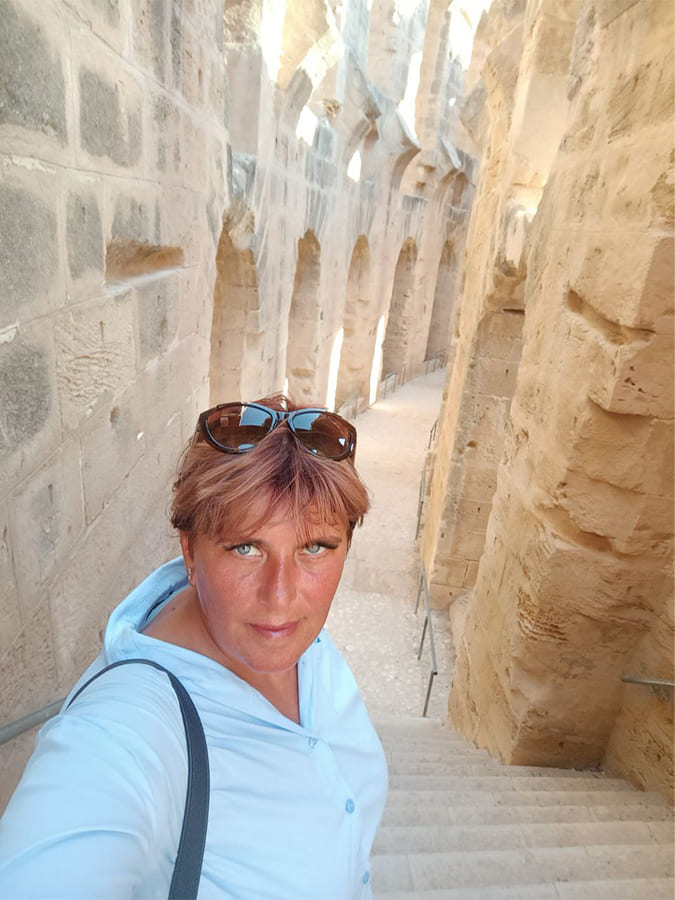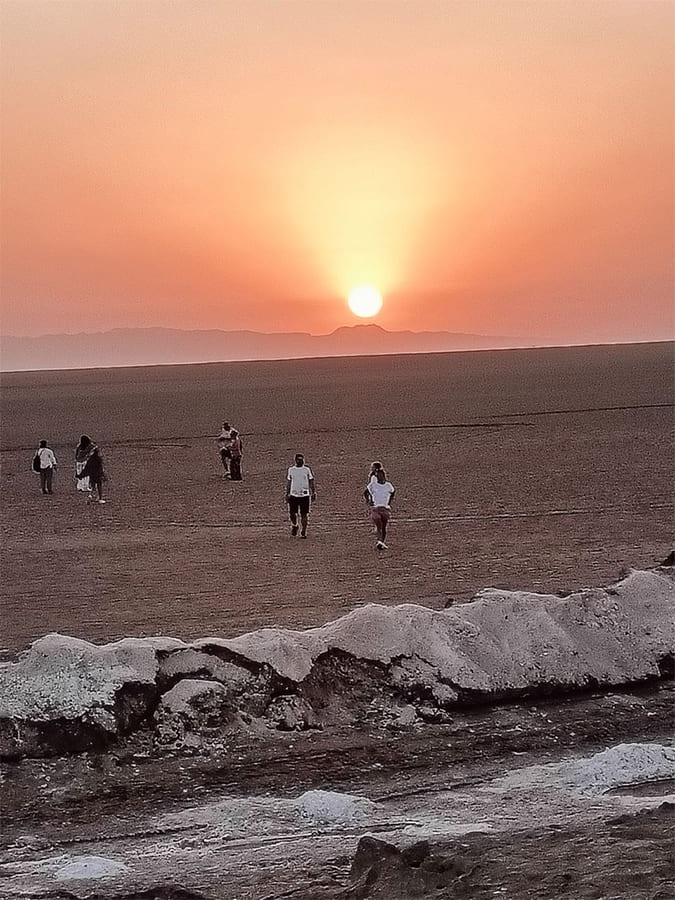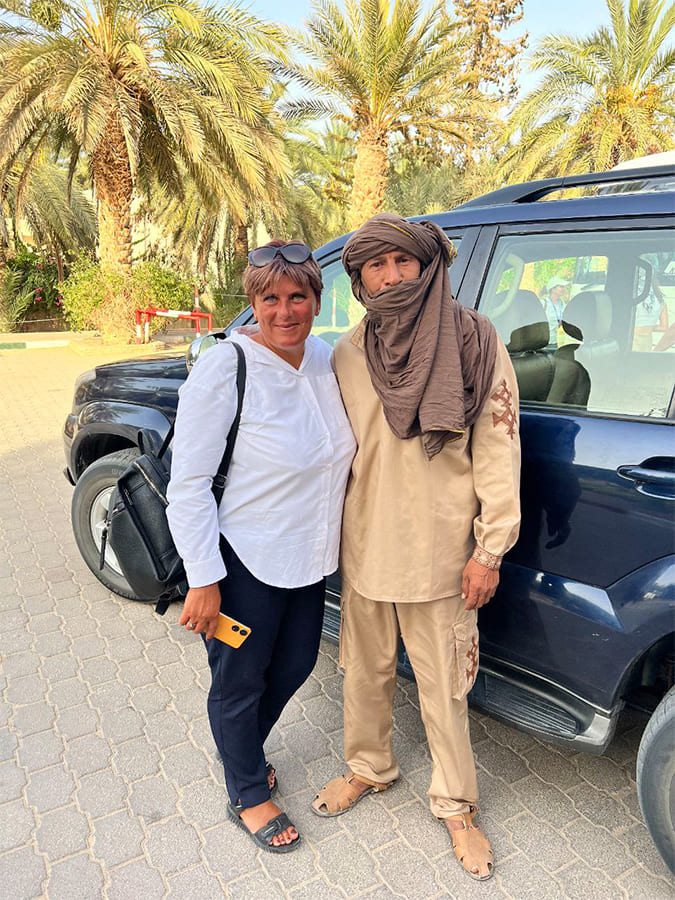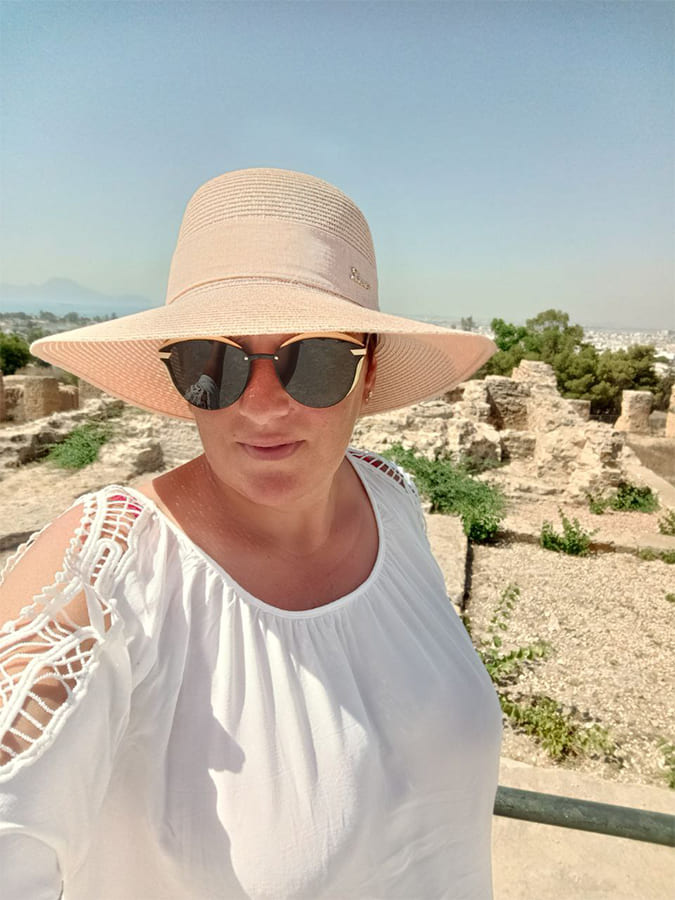The «Happiness Index» of CG Employees: Continuing the Conversation. Part II
In the first part of our conversation about the «Happiness Index» of employees at Carthage Group, we interviewed hotel guides from Hammamet, Denis and Damian.
The guys came to the African Mediterranean from Moldova and shared their impressions of life in Muslim Tunisia, talked about a welcome received from the international team of our company, described what their work in tourism in general and at Carthage Group in particular is like, and, of course, that’s not all.
In this article, we continue the series of mini-interviews and we’re glad to share with you the stories of two other members of our team.
Veronika Pintiak-Lutar: «He promised to pay me 10 euros if I could talk him out of going to the Sahara…»
Where are you from, and what is your education?
I’m from Ukraine. I graduated from the Pedagogical University in Odessa, specializing in mathematics. However, I never worked as a teacher; starting a pedagogical university was rather my parents’ wish, not mine. I couldn’t see myself standing in front of a classroom full of kids.
Teacher salaries were also quite low when I graduated, so I decided not to work at a school and tried something else instead.
I moved to Slovenia, to the town of Postojna, got married, and worked as a translator on guided tours, which was my first step into tourism. Later, I relocated to Poland, where I spent several years doing purely technical work and became a forewoman at the LG Electronics factory.
Wow, what impressive twists and turns! So how did you end up back in tourism?
It was an incredible coincidence that completely changed my life. I was on vacation in Tunisia with my family, and once, after a phone conversation in Romanian, I received an unexpected question from a guide I’d met during an info meeting: «Carthage Group needs people with such strong Romanian language skills. Would you be interested in discussing it? Would you like to work with us?»
At first, I was taken aback. Then I asked for two days to think it over and to take a closer look at the country.
And what happened during those two days? What exactly did you see?
We went on the «Three Capitals» guided tour, which was a great opportunity to look at Tunisia from different angles. The itinerary included the famous Carthage, an ancient capital with an incredible history; the white-and-blue Sidi Bou Said, that is also called the town of romantics, artists, and poets; and, of course, the modern capital of the country, Tunis. It was fascinating.
I also paid closer attention to Tunisians, both those I interacted with in my hotel and outside. And I really liked them! Local people are friendly, responsive, always ready to give advice or help if needed, and often offering assistance themselves. So, after my 10-day vacation, I decided to stay.
/photos from Veronika’s personal archive/
What language do you use to communicate with the locals?
In addition to Romanian, I speak Polish, Slovenian, Ukrainian, Russian, and, of course, English, the international language I use with Tunisians.
I’ve also picked up some phrases in the local Arabic dialect, with «jamila,» meaning «beautiful», as the first word I learnt. Tunisians love to say nice things. For example, at the end of a workday, after an excursion where I’m translating, the Tunisian guide always compliments my efforts saying «jamila!»
What can you say about Tunisia as a Muslim country? Sometimes, people with a European mindset feel uneasy about getting close to this culture…
It’s very democratic here. The key is to know how to behave and show respect for traditions.
For example, it’s good to be tactful during Ramadan. Don’t sit down to eat in front of people who are fasting and don’t eat and drink anything until sunset. You can eat a bit later and in an appropriate place, at a restaurant or cafe.
As for clothing, there aren’t any restrictions, it’s very European. However, I personally prefer wearing mid length skirts, not mini.
Do you feel comfortable here and do you feel safe living in Tunisia?
Yes, there is definitely a sense of safety. No one bothers or whistles at you. Everything is very civilized and respectful.
What does your work involve, what are your duties?
I’m a hotel guide. Sometimes I also go on guided tours as a translator, mostly for shorter, one-day excursions to places like El Djem, Kairouan, and Dougga, or for a half-day trip to Hammamet from Sousse, where I currently live.
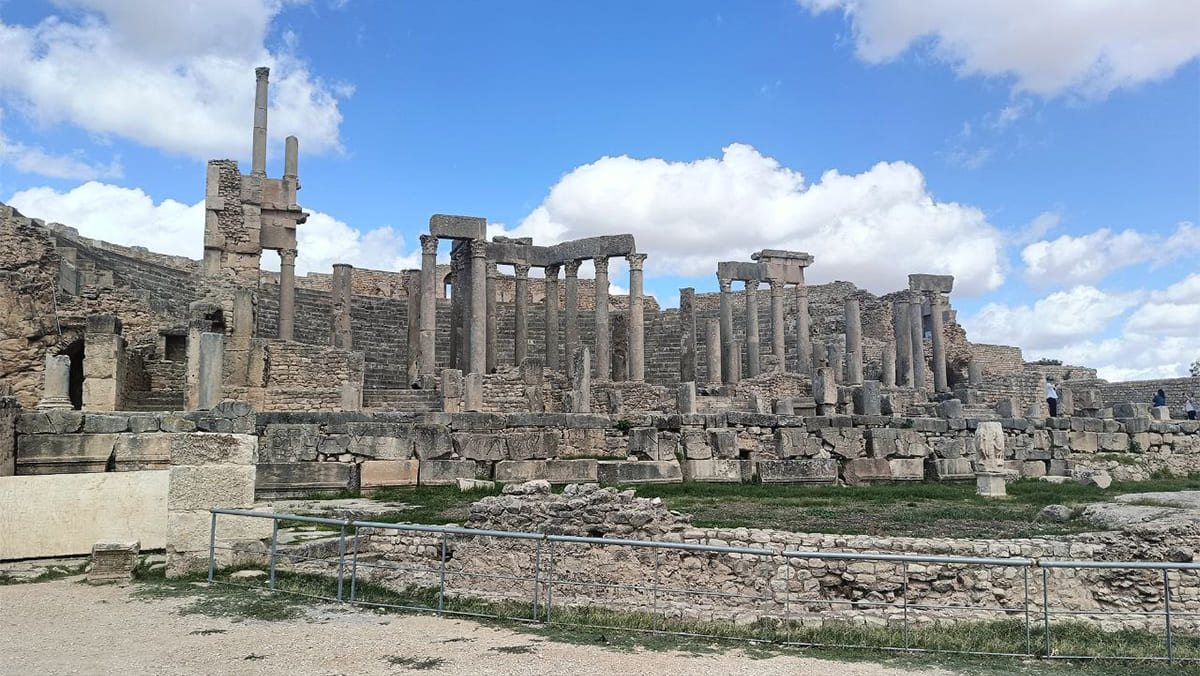
/photo from Veronika’s personal archive/
Do any force majeure or challenging situations arise in your work? Or perhaps funny ones?
Force majeure events are extremely rare for us. For example, this season I only had to call a doctor once when a tourist had an upset stomach. Generally, people get used to the food in Tunisia quite easily, as the hotel cuisine aligns well with the tastes and habits of European travelers.
As for funny moments, there’s plenty of them in our work! For instance, there was a guest who asked me to talk him out of going to the Sahara and promised to pay me 10 euros if I succeeded.
That’s an interesting step! Did you really try to talk him out of it?
Of course not! To miss out on such an amazing excursion would be a crime. It’s an incredible experience, a super interesting trip to ancient cities and fantastic landscapes. In addition, you’ll have an adrenaline rush while riding jeeps and ATVs.
Of course, a two-day trip can be tiring for some people. But believe me, after the Sahara adventure, the fatigue is truly pleasant. That’s exactly the kind of tiredness worth experiencing when you travel.
Carthage Group is a member of Legal Emplo, the Association of Employers in Tunisia. What do relationships with such an employer look like in terms of legality and safety? What benefits can you highlight about working in our company?
Yes, at Carthage Group, everything is indeed legal and safe. Plus, there’s a fantastic team here, completely free from envy and intrigue. Only genuine kindness and mutual support.
I’ve made friends with my colleagues, although due to our busy schedules, we often communicate over the phone. However, sometimes we meet at the airport or can enjoy a cup of coffee together in the evening at a cafe.
Before starting my job, I had a thorough training, and I can still turn to my more experienced colleagues, Elena Detochenko and Irina Boukadida, with any questions.
I’m also satisfied with my salary and, in fact, everyday «All Inclusive» when the company covers meals, accommodation, and excursions during the training period, as well as provides a monthly transportation allowance.
/photos from Veronika’s personal archive/
How do you spend your free time? What do you enjoy doing?
During the peak season, I spent almost all my weekends on excursions, working with tourists. However, in the evenings, I relaxed on the beach, soaking up the sun.
And I’ve already mentioned that I enjoy sitting in a cafe with a cup of coffee. By the way, they make delicious coffee at the restaurant Novastoria in Hammamet, where we stop with tourists during the guided tour of the town.
Finally, the main question. Expectations vs. Reality: tell us, has everything turned out in Tunisia as you dreamed and hoped? What does your personal «happiness index» show here?
I thought it would be much harder. I was nervous that I wouldn’t manage it since I initially had no experience working as a hotel guide. But I overcame all those fears thanks to the responsiveness of my colleagues. And I was lucky with the tourists as well; working with travelers from Romania is a pleasure.
In short, this is the first job in my life that I go to every morning, without exception, with a smile on my face. I’m happy!
And I’ve already asked to return to work with Carthage Group next year, and I hope it’ll work out.
Petya Petkova-Pagano: «Carthage Group is my new family in Tunisia. Thank you very much for everything!»
Where are you from? What is your background and which languages do you speak?
I’m from Bulgaria, from the city of Varna. I have two higher education degrees: a bachelor’s degree from the Economic University and a master’s degree from the Free University in Varna, specializing in «Economic Expertise.»
I speak Bulgarian, Russian, and English, and I speak Italian a little less fluently. I communicate with the locals in Tunisia using a mix of English and Italian. Although I’ve learnt a few phrases in the Tunisian Arabic dialect, I enjoy seeing how my colleagues are happy when I repeat some new words after them.
How long have you been working in tourism? What are your current duties?
I started working in tourism three years ago when I came to Tunisia with my husband, who is from Italy and also came here for work. I got a job as a translator, working with the Bulgarian language. I try to convey accurately and precisely what the guides say to our guests. My teammates say they enjoy working with me. There are no issues, and complete mutual understanding is established with the tourists, of course, it’s very important.
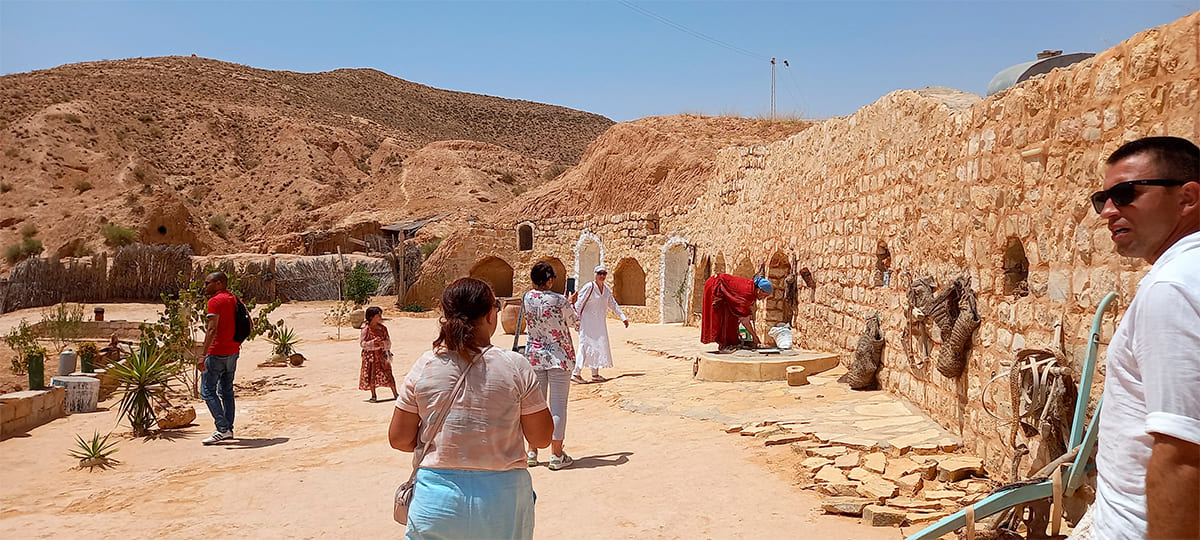
/photo from Petya’s personal archive/
How did Tunisia welcome you? Do you feel comfortable being in this country?
I really like it here. People in Tunisia are kind and responsive, always ready to help. They also almost always smile and seem to be in a good mood. I’ve found some truly good friends here, which is valuable.
Working at Carthage Group and going on excursions has allowed me to learn a lot about the traditions and culture of Tunisia. The opportunities that this job provides are a real treasure for me.
Do you have a heavy workload, spending a lot of time on excursions? What about your days off?
Yes, when a lot of tourists arrive, we arrange many guided tours. If necessary, we work almost without days off. In September there was a large influx of guests. However, August was quieter, and I had time to rest for 2 or sometimes even 3 days each week.
And how do you usually spend your free time in Tunisia?
I really love the sea and the beach. I enjoy taking walks with my husband and gathering with friends.
Another passion of mine is traveling. It’s great that I can open up new horizons not just during vacations or weekends, but even on regular working days.
I have visited all the main attractions in Tunisia, and each one is unique. I was captivated by incredible Sidi Bou Said, cozy Hammamet, and fascinating Kairouan, which has a mesmerizing old Arab medina, especially the area where Bir Barrouta spring is located. The water from there is considered holy because, according to legend, Bir Barrouta is connected to the Zamzam spring in Mecca. It’s also said that General Uqba ibn Nafi, the founder of Kairouan, found his lost golden bowl there, which had been lost in Mecca.
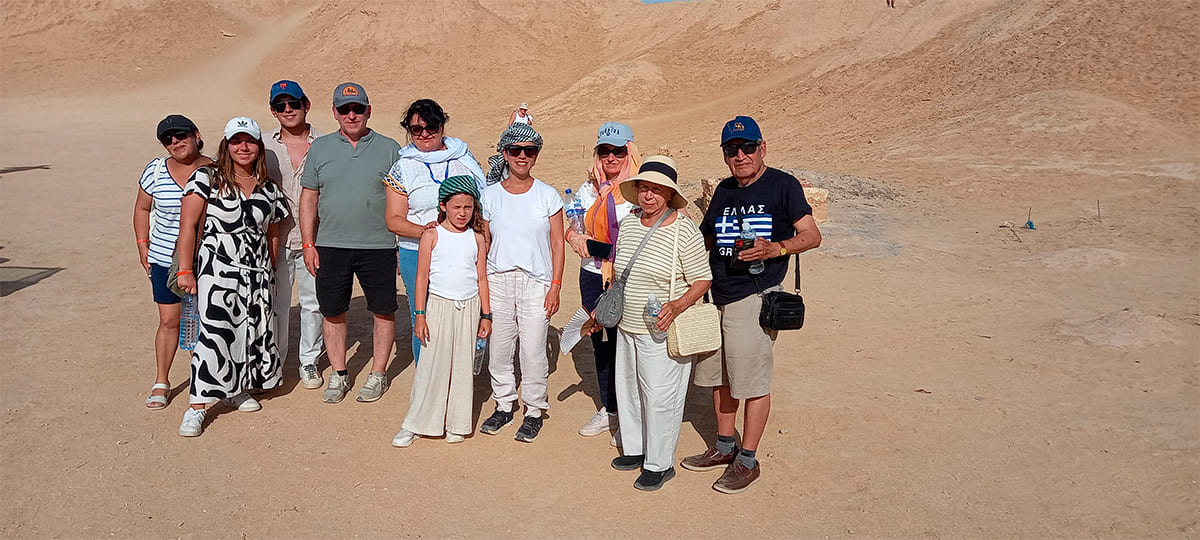
/photo from Petya’s personal archive/
Sounds wonderful! And let me ask you our mandatory question. Expectations vs. Reality: has everything in Tunisia and at Carthage Group turned out as you dreamed and hoped?
I like Tunisia much more than I could have imagined before coming here. It has a magnificent climate, delicious food, and of course, wonderful people, kind and calm. I’m grateful for a twist of fate that brought me to this country.
I have also grown very fond of my colleagues.
At first, when I just started working, I was incredibly nervous. But my teammates, Alex, Mohamed, Tatiana, helped me. They supported me and taught me various professional nuances. They were patient with me, for which I am very grateful. Support, assistance, and respect, that’s how I would describe the relationships among colleagues in our team.
Carthage Group is my new family in Tunisia. Thank you very much for everything!


